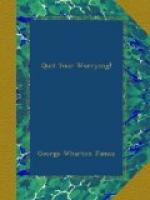An old countrywoman once said in my hearing: “Worry, and you hug a hornet’s nest.” How suggestive both of the stinging that was sure to come and the folly, the absurdity, the cruelty to oneself of the act.
The great Scotch philosopher, Blair, said: “Worry (or anxiety) is the poison of human life,” and how true it is. How biting, how corroding, how destructive to life some poisons are, working speedily, suddenly, awfully. Others there are that have a cumulative effect, until life itself cannot bear the strain, and it goes out. Recently I was at a home where a son was so worried over conditions that he felt ought not to exist between his parents, that he totally collapsed, mentally, and for a time was in danger of losing his reason. The folly of his attitude is apparent to everyone but himself, though he now seeks in the absorbing occupation of teaching, to free himself from the poison of worry that was speedily destroying his reason.
Henry Labouchere, the sage who for so many years has edited the London Truth, once wrote a couplet, that is as true as anything he ever wrote:
They who live in a worry,
Invite death in a hurry.
I want to be ready for death when it comes, but as yet I am not extending an invitation to the gentleman with the scythe. Are you, my worrying reader, anxious to be mowed down before your time? Quit your worrying, and don’t urge the Master Reaper to harvest you in until He is sure you are ready.
Another sage once said: “To worry about to-morrow is to be unhappy to-day,” and the same thought is put into: “Never howl till you are hit,” and the popular proverb attributed erroneously to Lincoln for it was long in use before Lincoln’s time: “Do not cross the stream until you get to it.” Christ put the same thought into his Sermon on the Mount, when He said: “Sufficient unto the day is the evil thereof.” How utterly foolish and wrong it is to spoil to-day by fretting and worrying over the possible evils of to-morrow. Many a man in business has ruined himself by allowing worries about to-morrow to prevent him from doing the needful work of to-day. The rancher who sits down and worries because he fears it will not rain to-morrow, or it will rain, fails to do the work of to-day ready for whatever the morrow may bring forth. The wise Roman, Seneca, expressed the same thing in other words when he wrote: “He grieves more than is necessary who grieves before it is necessary,” and our own Lowell had a similar thought in mind which he expressed as follows: “The misfortunes hardest to bear are those which never come.” Even the Chinese saw the folly of worrying over events that have not yet transpired, for they have a saying: “To what purpose should a person throw himself into the water before the boat is cast away (wrecked).”
All these proverbs, therefore, show that the wisdom of the ages is against worrying over things that have not yet transpired. Let to-morrow take care of itself. Live to-day. As Cardinal Newman’s wonderful hymn expresses it:




